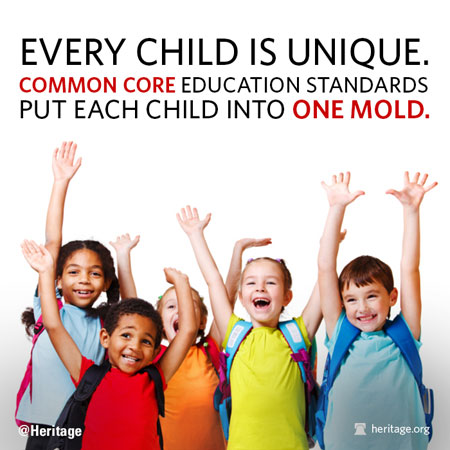Two competing forces are pushing on America’s K–12 education system today.
One is an effort to infuse education choice into a long-stagnant system, empowering parents with the ability to send their child to a school that meets her unique learning needs.
The other is an effort to further centralize education through Common Core national standards and tests.
Across the country, education choice options have been proliferating rapidly, including vouchers, tuition tax credits, special needs scholarships, and education savings accounts. Educational choice is a revolution because it funds children instead of physical school buildings and allows dollars to follow children to any school—or education option—that meets their unique learning needs.
- Choice empowers parents to direct their child’s share of education funding, giving them options beyond an assigned government school.
- Choice pressures public schools with a much-needed competitive atmosphere, which works toward improving educational outcomes for students who take advantage of choice options as well as students who choose to attend their local public schools.
- Choice helps kids. Seventeen states and Washington, D.C., now have private school choice programs—and more states are considering implementing choice options. Education choice represents the type of innovation and freedom that will provide long-overdue reform to the K–12 education system, and holds the potential to truly raise educational outcomes for every child across the country.
But at the same time this encouraging shift toward education choice is underway, there is a push to take education in the exact opposite direction through Common Core national standards and tests.
- Common Core is an effort to centralize education by dictating the standards and assessments that will determine the content taught in every public school across the country.
- Common Core has no evidence that it will improve academic outcomes or boost international competitiveness. But the Obama Administration has pushed states to adopt national standards and assessments in exchange for offers of billions of dollars in federal funding and waivers from the onerous provisions of No Child Left Behind.
- Common Core assumes that top-down, uniform standards and assessments—driven by federal bureaucrats and national organizations—are preferable to the state and local reform efforts guided by input from parents, teachers, and taxpayers.
American education is at a crossroads: One path leads toward further centralization and greater federal intervention. The other path leads toward robust education choice, including school choice and choice in curricula.
Common Core takes the path toward centralization, and state leaders should seize the moment to resist this latest federal overreach. National standards and tests are a challenge to educational freedom in America, and state and local leaders who believe in limited government should resist them.
This post originally appeared on Heritage.org.
